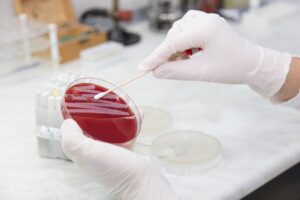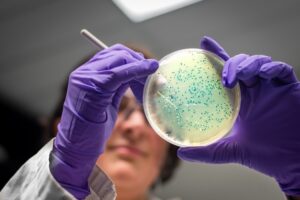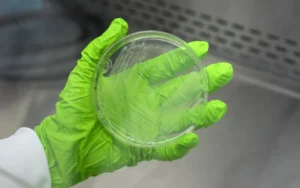In the labyrinth of modern healthcare, a silent crisis is brewing – the undue rise of pharmaceutical pollution and its sinister ally, superbugs.
This article dives deep into the murky waters of pharmaceutical health pollution and illuminates how unchecked practices, from farming to improper drug disposal, are fuelling a scenario the UN warns could send us back to a pre-antibiotic era. Captivating findings, global warnings, and actionable insights – it's all here. If you've ever pondered the link between your medicine cabinet and global health risks, you're in the right place.
Pharmaceutical Pollution Rise: Superbugs in the Spotlight
In the unseen corridors of our ecosystems, a silent crisis looms large: the rise of pharmaceutical pollution, an issue finding its terrifying partner in crime—superbugs.
 As medical advances save lives, the unseen consequence of their widespread use and improper disposal leads to a dangerous increase in drug-resistant bacteria. This phenomenon isn't just a speculative horror story; it's the grim reality we face today.
As medical advances save lives, the unseen consequence of their widespread use and improper disposal leads to a dangerous increase in drug-resistant bacteria. This phenomenon isn't just a speculative horror story; it's the grim reality we face today.
The misuse of antibiotics in human healthcare and agricultural practices compounds the issue, catapulting us toward a future where minor infections could become lethal.
Recognizing the stakes, it's imperative to understand how our consumption habits and disposal methods contribute to this escalating problem. This isn't merely about the environment; it's a stark wake-up call for the protection of global public health and the enduring effectiveness of the medications we've come to rely on.
UN Warns: The Global Threat of Pharmaceutical Pollution Fuelling Superbugs
The United Nations has issued stark warnings about the global threat posed by pharmaceutical pollution fuelling the rise of superbugs.
- This critical situation has catapulted antibiotic resistance to the forefront of international health concerns.
- The World Health Organization categorizes antibiotic resistance as one of the top ten global public health threats facing humanity.
As pharmaceutical residues infiltrate water sources and soil, they foster environments where resistant bacteria can flourish and spread. These superbugs, impervious to current treatments, signify a potential return to an era where common infections and minor injuries could spell disaster. The UN's alert underscores the urgent need for collective action, spanning governments, industries, and individuals, to address this growing menace before it escalates beyond control.
Farming and Drug Disposal: Accelerators of Pharmaceutical Health Pollution
 Farming practices and drug disposal methods are significant accelerators of pharmaceutical health pollution, a fact often overshadowed by the focus on direct healthcare contributions. Agriculture employs large quantities of antibiotics to promote livestock growth and prevent disease, inadvertently creating a hotbed for resistant bacteria.
Farming practices and drug disposal methods are significant accelerators of pharmaceutical health pollution, a fact often overshadowed by the focus on direct healthcare contributions. Agriculture employs large quantities of antibiotics to promote livestock growth and prevent disease, inadvertently creating a hotbed for resistant bacteria.
Meanwhile, improper disposal of medications—flushing them down toilets or tossing them into trash—allows those drugs to seep into water systems, affecting not only aquatic life but also the broader environment.
These practices contribute significantly to the dissemination of pharmaceutical pollutants and superbugs, entwining human health with environmental sustainability. Addressing these issues requires rethinking veterinary antibiotic use and promoting responsible drug disposal methods, essential steps toward mitigating the looming threat of unstoppable infections.
The Dire Health Risks of Untamed Pharmaceutical Pollution
The health risks of untamed pharmaceutical pollution extend far beyond the immediate threat of superbugs.
Endocrine-disrupting chemicals (EDCs) found in many pharmaceuticals can interfere with the hormonal systems of both wildlife and humans, leading to reproductive and developmental issues, and potentially contributing to cancers. Aquatic ecosystems are particularly vulnerable, with studies highlighting altered reproductive behaviors and decreased populations among exposed species.
Human communities reliant on contaminated water sources may face increased risks of chronic illnesses. These pervasive health risks underscore the critical need to address pharmaceutical pollution not as a distant threat but as an immediate concern, necessitating sweeping reforms in drug manufacturing, prescribing practices, and waste management.
From Farming to Faucets: How Practices Propel the Pharmaceutical Pollution Crisis
From farming to our faucets, practices throughout the pharmaceutical lifecycle propel the pollution crisis, threading a complicated web between health and environmental sustainability.
 In agriculture, the heavy use of veterinary antibiotics contaminates water run-off, introducing pharmaceutical compounds into natural waterways. Similarly, industrial processes and inadequate waste treatment facilities release drugs and their metabolites into rivers and lakes.
In agriculture, the heavy use of veterinary antibiotics contaminates water run-off, introducing pharmaceutical compounds into natural waterways. Similarly, industrial processes and inadequate waste treatment facilities release drugs and their metabolites into rivers and lakes.
At the consumer level, the casual disposal of expired or unused medication exacerbates the issue, turning household bathrooms into inadvertent pollution sources. These practices bridge the journey of pharmaceuticals from production lines to our environment, implicating a broad range of stakeholders in the fight against pollution. Addressing this requires a concerted effort to embrace sustainable practices across all phases of drug life, from development to disposal.
Combating the Crisis: Solutions to Stem the Rise of Pharmaceutical Health Pollution and Superbugs
Combating the crisis of pharmaceutical health pollution and the rise of superbugs necessitates multifaceted solutions.
Stakeholders across the spectrum must unite in a concerted effort to counter this global threat. Key strategies include enhancing pharmaceutical take-back programs to ensure safe disposal of unused medications, bolstering regulations on antibiotic use in agriculture to minimize unnecessary applications, and investing in wastewater treatment technologies capable of removing pharmaceutical residues.
Furthermore, fostering innovation in pharmaceuticals, such as developing drugs that degrade safely in the environment, holds promise for reducing pollution at the source. Public education campaigns play a critical role, empowering individuals with the knowledge to make responsible decisions regarding medication disposal and antibiotic usage. Together, these actions pave the way toward mitigating the rampant spread of superbugs and safeguarding public health in the face of pharmaceutical pollution.
